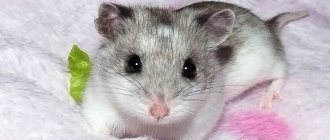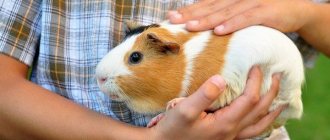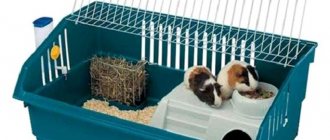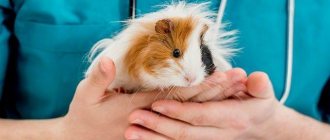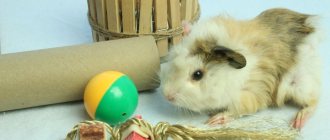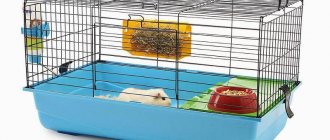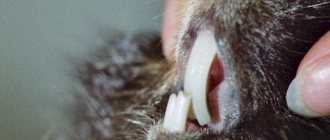- home
- Guinea pig
- Guinea pig health
02/07/2019 If a guinea pig has diarrhea, then help should be provided to the pet as soon as possible. The painful condition of an animal can be caused by various reasons. This article describes what to do with diarrhea, how dangerous it is and how to treat this disease.
Causes of diarrhea
Diarrhea in a guinea pig can be the result of an illness or a simple intestinal disorder. More specifically, these could be:
- Worm infestation;
- bacterial infections;
- fungi;
- stale water and food;
- cold;
- dental problems;
- nervous tension.
Regardless of the cause of diarrhea, your guinea pig must be taken to a veterinary clinic. Even intestinal upset due to inappropriate food can be fatal.
Prevention
The best treatment for diarrhea is proper and regular prevention. To minimize the chances of recurrence of the disease, follow some rules:
- Do not feed foods that have a laxative effect.
- When buying a pet, find out about its diet; an unexpected change can cause diarrhea.
- Before feeding the animal, check the food for quality.
- Clean and disinfect the cage and its contents regularly.
- Make sure that the greens are not rotten or wet.
- Food must be fresh, without signs of mold.
- Even if you walk your pet from time to time, movement helps improve immunity.
Follow these guidelines and your guinea pig will not have problems with diarrhea.
Symptoms
Diarrhea itself is a symptom of illness or digestive problems. In addition to diarrhea, your pet may experience accompanying symptoms:
- Rapid pulse;
- loss of appetite;
- loose stools;
- apathy;
- hard breath;
- painful sensations when palpating the abdominal area;
- temperature increase;
- rumbling in the stomach;
- blood in stool.
Even before severe diarrhea appears, foam appears in the pet’s excrement, the feces emit a strong unpleasant odor, the consistency of the excrement is softer than usual, and the excrement sticks to the animal’s butt and fur.
Signs of illness
Each affected rodent will exhibit its own symptoms depending on the cause of the disorder. But there are also general signs that indicate the animal’s poor health:
- apathy: the rodent reacts poorly to others, lies down more, tries to hide in a secluded corner, breathes heavily;
- lack of appetite;
- increased body temperature if there is an infectious onset of the disease;
- increased heart rate;
- chills;
- tousled fur;
- abdominal pain.
The following symptoms are observed with diarrhea:
- the anus area is contaminated with feces, the hair is stuck together, a characteristic fetid odor emanates from the animal;
- loose, frequent, foamy bowel movements,
- the stomach is swollen due to increased gas formation,
- By palpating the abdominal cavity, you can feel the movement of the intestines and even hear the characteristic rumbling and bubbling, indicating increased peristalsis of the digestive tube.
Constipation is characterized by:
- protrusion of the anus;
- absence of bowel movements for a long time;
- the presence of a hard cord in the intestine, which can be felt when palpating the abdomen;
- abdominal wall pain.
Kinds
The consistency of stool is an important factor in determining the cause of diarrhea. But only a veterinarian can determine the disease, having previously received test results.
Abnormal state of excrement:
- Liquid;
- watery;
- with blood;
- with foam.
If the feces are unformed, then your pet should be taken to the veterinarian. The presence of blood in the stool means there is internal bleeding. In this case, damage to internal organs or a tumor is suspected.
Why do they vilify?
Diarrhea in piglets is characterized by frequent bowel movements. Feces have a liquid consistency and may contain mucus, foam, bloody clots, and inclusions.
Diarrhea can occur in newborns, older animals, and adult pigs.
Important! If diarrhea appears in piglets that constantly feed on sow's milk, treatment should be prescribed immediately. As a rule, there are several sick suckers in a litter.
The main cause of stomach upset in piglets and adult animals can be called errors in nutrition, an unbalanced, poor-quality diet.
Diarrhea in piglets can also occur with a sudden change in diet, type of food, or feeding with rotten, low-quality feed.
If piglets are diarrhea, possible reasons include:
- lack of proper hygiene in premises where animals are kept;
- poisoning with toxic substances, plant seeds;
- helminthic infestations;
- contagious and non-contagious diseases;
- hypothermia of the body, insufficient temperature conditions in pigsties;
- hypo-, vitamin deficiency;
- congenital, acquired pathologies of the gastrointestinal tract;
- metabolic disorder.
Diarrhea in piglets often indicates that they are infected with some kind of infection, viral, bacterial, or parasitic disease. Diarrhea in pigs can also occur due to overeating or eating poisonous plants.
Newborns
When suckling piglets have diarrhea, frequent, intense discharge of watery feces is noted. Since diarrhea in newborn babies is a relatively uncommon occurrence, the cause of this condition lies in the nursing sow.
She may be infected with viruses, bacteria, or internal parasites that cause intestinal infections, especially if she is often separated from her brood.
If the piglets are diarrhea, this can also be caused by the fact that the diet of the lactating sow consists of a large amount of rough, solid feed.
Some types of herbs and plants that pigs eat can also cause stomach upset in babies. Large amounts of milk often cause diarrhea in sucklers.
At the suckers
In suckling piglets, diarrhea is associated with the following factors:
- Mastitis in a sow, which leads to changes in the quality characteristics of milk. In this case, treatment of the mother is necessary. Symptomatic therapy is carried out for the brood.
- Lack of milk leads to a lack of nutrients and stool upset.
- Sow hunting. After a week, the level of prolactin, the hormone responsible for milk production, may decrease in the mother’s blood. A decrease in its concentration also leads to an increase in sexual desire: the sow becomes restless.
- The increased fat content of milk significantly dilutes the stool of piglets. To normalize the composition, it is necessary to select a special diet for the mother.
- Cold indoors.
Grown up
In older piglets at the age of 2–3 months, diarrhea is a fairly common occurrence. Stomach upset can be caused by a variety of factors.
At the age of several months, babies lead a mobile, active lifestyle. If piglets are released for walking, they can catch intestinal infections and diseases from other domestic animals, birds, and rodents.
Very often, the cause of diarrhea in piglets is viral-bacterial diseases, which pose a danger not only to the health, but also to the life of the animals. Infection can occur through contact, nutritional, or erogenous routes.
Mumps can contract an infection from hidden virus carriers. If other side symptoms are noticeable against the background of diarrhea, it is necessary to urgently take appropriate measures and begin treatment.
If diarrhea in small piglets is not a symptom of infections, diseases, an upset stomach can be caused by hot weather conditions. Severe overheating, like hypothermia, has a very negative effect on the functioning of the digestive tract.
In older piglets, diarrhea can be caused by overeating. Little pigs lead an active lifestyle and if they get very hungry, they begin to greedily eat food.
Poorly ground, roughage food provokes stomach upset in these animals for several days. Your veterinarian will tell you how to treat diarrhea in piglets at home, since therapy and further actions depend on the root causes that provoked this condition.
First aid
You should not self-medicate if your guinea pig has diarrhea. It is necessary to find out the cause in order to be sure that the correct treatment is prescribed and the disease is not dangerous to other animals and humans. But before your pet appears at the ratologist’s appointment, you can give your guinea pig for diarrhea:
- Smecta. A sixth of the sachet is dissolved in water and the pet is given water from a syringe without a needle.
- Activated carbon. The amount of the drug is calculated based on the weight of the animal; 1 gram of coal is taken per 1 kilogram of the pet’s weight. Then they are diluted in water and soldered to the pet.
Immediately after the first signs of diarrhea appear, it is necessary to change the water in the drinking bowl and add a few drops of potassium permanganate to it. This is necessary to disinfect the liquid.
Treatment
Diarrhea causes dehydration. To replenish the lack of moisture, the animal is given rice or oatmeal broth. In addition to replenishing fluid in the body, decoctions contribute to the formation of harder stool.
To clean the intestines, you need to give the rodent a solution of smecta, activated carbon or enterosgel.
The pet's cage is washed every time it gets dirty. Unpleasant odors aggravate the animal's unhealthy condition.
To cope with inflammation and consolidation of stool, the pet is given decoctions of chamomile and oak bark.
To treat diarrhea in a guinea pig, it is necessary to restore the intestinal microflora. The pig is given special probiotics for rodents. Probiotics for humans are strictly prohibited from being given to pigs due to the fact that they contain lactose. Animal products should not be given to these animals.
Preventive measures
The owner needs to pay attention to the prevention of diarrhea to reduce the risk of its occurrence. Bacterial and fungal infections are often the result of poor quality care
The cage should be washed regularly, and it and the animal’s equipment should be treated monthly with safe disinfectants. Guinea pigs are washed when they become dirty. Owners must take a responsible approach to choosing food for their pet. His diet should not include foods containing chemicals. Food and water must be fresh. At the first sign of spoilage or doubts about the quality, the food should be thrown away. This will help avoid intestinal disorders.
Probiotics intended for rodents should be given to the animal periodically. They will ensure the maintenance of healthy intestinal microflora
It is important to pay attention to strengthening the animal’s immunity. To do this, you should follow a diet that supplies all the necessary minerals and vitamins, and if they are deficient, give special complexes. The natural defense system is strengthened with regular physical activity.
To do this, the guinea pig needs to be given walks every day and let out of the cage. Active movements around the house will not only strengthen the immune system, they have a beneficial effect on intestinal motility
The natural defense system is strengthened with regular physical activity. To do this, the guinea pig needs to be given walks every day and let out of the cage. Active movements around the house will not only strengthen the immune system, they will have a beneficial effect on intestinal motility.
Diarrhea can also be a consequence of colds. Therefore, you need to install the cage in a place where there are no drafts. It should also be remembered that stress can cause diarrhea. This possibility must be excluded. The pet deserves careful, attentive treatment.
Authors of the articles: Belanta Clinic team
Diet for diarrhea
In case of diarrhea, juicy foods are removed from the usual diet. They are replaced with hay. The patient's menu includes solid vegetables, herbs, and grains. Be sure to ensure that the rodent drinks water.
After stool normalization, juicy fruits and vegetables are introduced little by little. If the situation repeats, then it is necessary to remove them from the diet and submit feces for analysis.
If food is refused, the pig is fed through a syringe. You should buy expensive, high-quality food and soak it.
